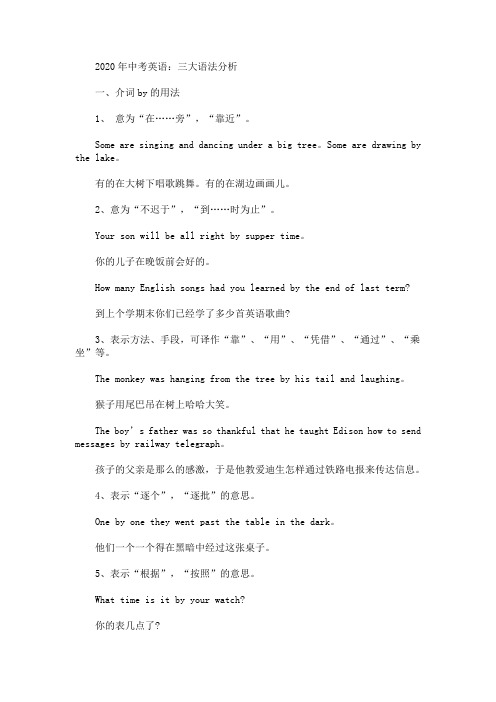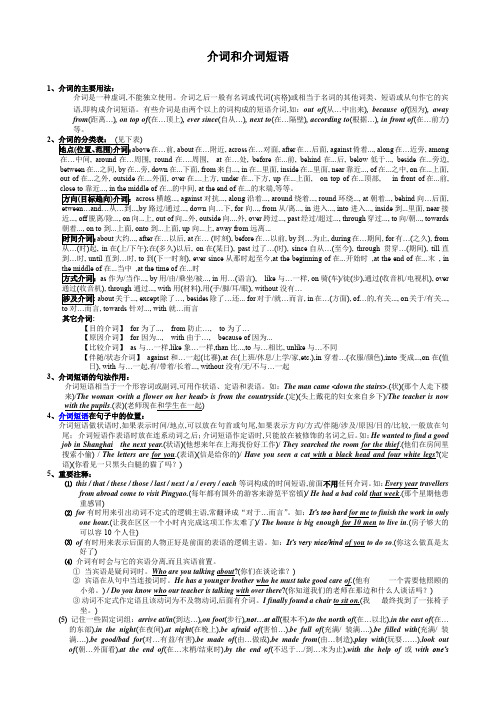2020中考语法介词精讲
- 格式:docx
- 大小:22.07 KB
- 文档页数:8


2020年中考英语:三大语法分析一、介词by的用法1、意为“在……旁”,“靠近”。
Some are singing and dancing under a big tree。
Some are drawing by the lake。
有的在大树下唱歌跳舞。
有的在湖边画画儿。
2、意为“不迟于”,“到……时为止”。
Your son will be all right by supper time。
你的儿子在晚饭前会好的。
How many English songs had you learned by the end of last term?到上个学期末你们已经学了多少首英语歌曲?3、表示方法、手段,可译作“靠”、“用”、“凭借”、“通过”、“乘坐”等。
The monkey was hanging from the tree by his tail and laughing。
猴子用尾巴吊在树上哈哈大笑。
The boy’s father was so thankful that he taught Edis on how to send messages by railway telegraph。
孩子的父亲是那么的感激,于是他教爱迪生怎样通过铁路电报来传达信息。
4、表示“逐个”,“逐批”的意思。
One by one they went past the table in the dark。
他们一个一个得在黑暗中经过这张桌子。
5、表示“根据”,“按照”的意思。
What time is it by your watch?你的表几点了?6、和take , hold等动词连用,说明接触身体的某一部分。
I took him by the hand。
我拉住了他的手。
7、用于被动句中,表示行为主体,常译作“被”、“由”等。
English is spoken by many people。
英语被许多人说。
(即“许多人讲英语。

初三英语语法精讲巧练5-介词(含稳固练习及答案)介 (prep.):表示名、代等和句中其余的关系。
1. 介后跟名,跟人称代的格,跟的ing 形式。
表示的介:at, in, on, before, after, by, until, till, for, during, through, from, since, in, within 表示所的介:at, in , on , under, above, over, below ,by, near, between, around, opposite 表示方向的介:into, out of, along, across, through, up, past表示手段和资料的介:with, in, by⋯The boy is standing by the window.The girl behind me is my sister.It ’ s a fine day today. What about going to the park?2.介的固定搭配与的搭配 look for, take care of, turn on, get on, pick up 与名的搭配 on time, in bed, at nighton Friday/ September 10 th/Christmas(eve)/the evening of October 1/a cold winter afternoon与形容的搭配be good at, be kind to⋯3. 中考介常考重点1). 清晨、下午、夜晚要用in例: in the morning/ afternoon/ evening 2). 拂晓、正午、夜晚、以及刻点要用在清晨at/下午 / 夜晚例: at dawn, at daybreak 在拂晓候at noon 在正午at night 在夜at midnight at seven o’ clock在7点3). in+年/季/月/世on+ 详细某一天(日,礼拜,日);in 2020在2020年in May在五月in December, 2020在2020年12月in winter在冬天on May 1在5月1日on Tuesday 在周二on Christmas 在圣季4). 由 every, this , last, next 组成的状前不用介(注意在写作中的运用)5). 和地址用是,in 表示在 ......里, on 表示在 ......上, in 后跟比大的地址,小的地址。

介词和介词短语1、介词的主要用法:介词是一种虚词,不能独立使用。
介词之后一般有名词或代词(宾格..)或相当于名词的其他词类、短语或从句作它的宾语,即构成介词短语。
有些介词是由两个以上的词构成的短语介词,如:out of(从…中出来), because of(因为), away from(距离…), on top of(在…顶上), ever since(自从…), next to(在…隔壁), according to(根据…), in front of(在…前方)等。
2)above在…前, about在…附近, across在…对面, after在…后面, against倚着..., along在…近旁, among周围, round在….周围, at在…处, before在...前, behind在...后, below低于..., beside在...旁边, between在...之间, by在...旁, down在...下面, from来自..., in在...里面, inside在...里面, near靠近..., of在...之中, on在...上面, out of在...之外, outside在....外面, over在....上方, under在...下方, up在...上面, on top of在...顶部, in front of在...前,在...的中间, at the end of在...的末端,等等。
across横越..., against对抗..., along沿着..., around绕着..., round环绕..., at朝着..., behind向…后面,...,by路过/通过..., down向…下, for向..., from从/离..., in进入..., into进入..., inside到...里面, near接近..., off脱离/除..., on向...上, out of向...外, outside向....外, over跨过..., past经过/超过..., through穿过..., to向/朝..., towards 到...上面, onto到...上面, up向...上, away from远离...about大约..., after在…以后, at在… (时刻), before在…以前, by到…为止, during在…期间, for有…(之久), from, in在(上/下午);在(多久)以后, on在(某日), past过了…(时), since自从…(至今), through 贯穿…(期间), till直到…时, until直到…时, to到(下一时刻), ever since从那时起至今,at the beginning of在...开始时,at the end of在...末, in 在...当中,at the time of在...时as作为/当作..., by用/由/乘坐/被..., in用…(语言), like与…一样, on骑(车)/徒(步),通过(收音机/电视机), over), through通过..., with用(材料),用(手/脚/耳/眼), without没有…about关于..., except除了…, besides除了…还... for对于/就…而言, in在…(方面), of…的,有关..., on关于/有关...,, towards针对..., with就…而言其它介词:【目的介词】for为了..., from防止…,to为了…【原因介词】for因为..., with由于…, because of因为...【比较介词】as与…一样,like象…一样,than比...,to与…相比, unlike与…不同【伴随/状态介词】against和…一起(比赛),at在(上班/休息/上学/家,etc.),in穿着…(衣服/颜色),into变成...,on在(值日), with与…一起,有/带着/长着..., without没有/无/不与…一起3、介词短语的句法作用:介词短语相当于一个形容词或副词,可用作状语、定语和表语。


辽宁省中考英语语法精讲——介词九年级英语网络教学课件一、表示方位的介词二、表示计量的介词:at for by三、表示材料的介词:of from in四、表示工具或者手段的介词:by with on注意:五、表示关于的介词:of about on六、表示原因或者理由的介词:for,at,from,of,with,by,because of七、表示好像或当作的介词:like,as八、表示支持或反对的介词:against,for九、表示除某人某物外的介词:besides,exceptTHANKS!Click here to enter you text Click here to enter you text Click here to enter you text Click here to enter you text Click here to enter you text Click here to enter you text Click here to enter you text Click here to enter you text Click here to enter you text Click he re to enter you text Click here to enter you text Click here to enter you text Click here to enter you text Click here to enter you text Click here to enter you text Click here to enter you text Click here to enter you text Click here to enter you text。
2020中考英语:介词专题详解介词是一种虚词,它不能单独担任句子成分,必须与名词或代词或相当于名词的其他词类、短语或从句构成介词短语,才能担任句子成分。
一、介词的种类:介词按词形来分类,可分为简单介词和短语介词。
1、简单介词只指一个单词,如:in,on,after等。
2、短语介词是由两个以上单词集合而成,如:out of,in front of,because of,instead of等。
二、介词的用法1、作定语:介词短语作定语时,一律后置。
The book on the desk is mine.桌子上的书是我的。
He bought a house of five rooms.他买了一所有五个房间的房子。
A gentleman in white came into the hall.一个身穿白衣的绅士走进了大厅。
2、作状语:介词短语作状语时,修饰动词、形容词、副词或者整个句子。
Classes begin at eight.(修饰动词)八点钟开始上课。
Jane looks young for her age.(修饰形容词)珍妮看起来比她的实际年龄年轻。
The school is not far from my house.(修饰形容词)学校离我家不远。
To my surprise Li Ming passed the exam at all.(修饰全句)使我吃惊的是,李明居然考试及格了。
3、作表语He is in danger.他处于危险之中。
We are against/for you.我们反对/支持你。
It was because of the heavy rain we couldn’t go out.因为这场大雨,我们出不去了。
4、作宾语补足语Make yourself at home.放松一些,就和在你自己家一样。
We made him out of danger.我们使他脱离了危险。
2020中考语法介词精讲
1.介词和种类
(1)简单介词,常用的有at, in, on, about, across, before, beside, for , to, without等。
(2)复合介词,如by means of, along with, because of, in front of, instead of等。
2、介词和其他词类的习惯搭配关系
(1)和动词的搭配,如agree with, ask for, belong to, break away from, care about等。
(2)和形容词的搭配,如afraid of, angry with, different from, good at (3)和名词的搭配,如answer to , key to, reason for, cause of, visit to 等.
3.介词短语在句子中的作用:
(1) 作定语I know the answer to the question .
(2) 作状语The children are playing football in the playground .
(3) 作表语Mike is in the garden .
(4) 作宾补语He found himself in the middle of the mountain .
(5) 作主补语Tom was seen inside the classroom .
4、常考介词的意义与用法区别
(1)表示时间的介词
A. in; on; at
B. in; after; later
C. for; since
D. after; behind
(2)表示方位的介词
A. over; above;on
B. in; at
C. in; on; to
D. among; between
E. across;through; past
F. in the wall; on the wall; in the tree;on the tree
G. in front of; in the front of
H. except; besides; but
I.by; with; in。